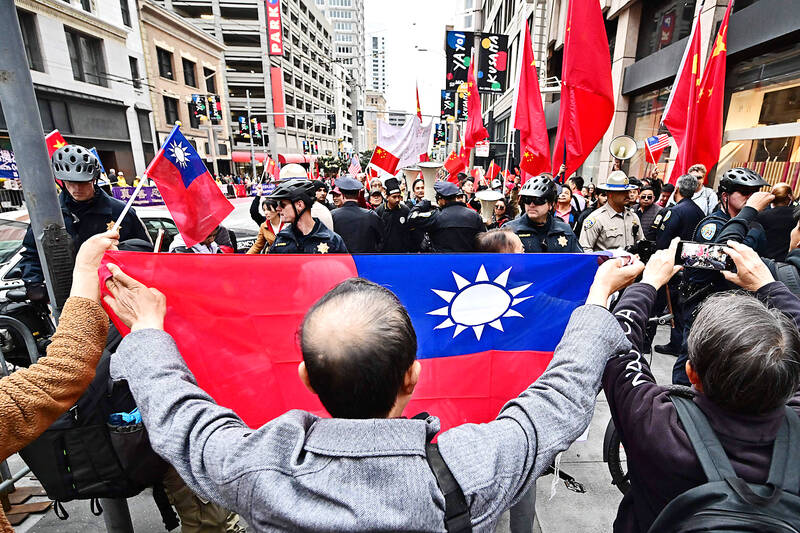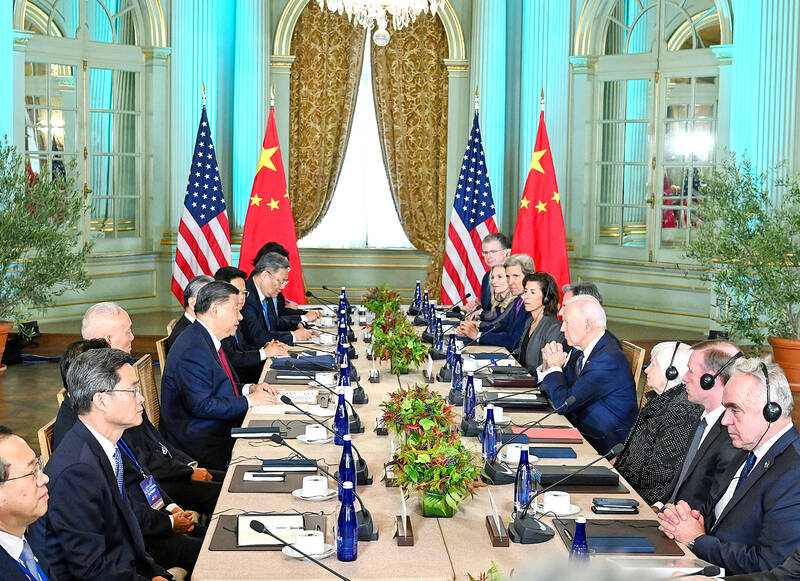US President Joe Biden said he “stressed the importance of peace and stability in the Taiwan Strait,” as he met with Chinese President Xi Jinping (習近平) for about four hours on Wednesday.
Biden also asked Xi to respect Taiwan’s electoral process, a senior US official told reporters.
Biden and Xi held a “clear-headed” and “not heated” discussion on Taiwan — the most sensitive topic in the relationship with the greatest potential to spiral into wider conflict. Biden said he reaffirmed the US’ “one China” policy and its belief that any resolution must be peaceful.

Photo: AFP
“I’m not going to change that,” Biden said. “That’s not going to change.”
He reiterated, though, that the US would continue to arm Taiwan as a deterrent against any attempt by China to use force to invade the nation.
Xi told Biden he had no plans to invade the nation, although Biden chided him for China’s massive military build-up around Taiwan, the US official said.

Photo: EPA
Xi told Biden during their meeting that Taiwan was the biggest, most dangerous issue in US-China ties, the official said.
The official quoted Xi as saying that China’s preference was for peaceful “reunification” with Taiwan, but that he went on to talk about conditions in which force could be used.
Xi was trying to indicate that China is not preparing for a massive invasion of Taiwan, but that does not change the US’ approach, the official said.
“President Xi ... underscored that this was the biggest, most potentially dangerous issue in US-China relations, laid out clearly that, you know, their preference was for peaceful ‘reunification,’ but then moved immediately to conditions that the potential use of force could be utilized,” the senior US official told reporters.
Biden responded by assuring Xi that Washington was determined to maintain peace in the region.
“President Biden responded very clearly that the long-standing position of the United States was ... determination to maintain peace and stability,” the official said.
“President Xi responded: Look, peace is ... all well and good, but at some point we need to move towards resolution more generally,” the official said.
Biden and Xi met for the first time in a year for talks aimed at easing friction between the two superpowers over military conflicts, drug trafficking and artificial intelligence (AI), and they said they had made “real progress.”
Biden said talks with Xi had yielded progress in repairing strained ties in the bilateral relationship, hailing agreements to restore high-level military communications, combat fentanyl and open a dialogue over AI.
“I believe they were some of the most constructive and productive discussions we’ve had,” Biden said at a press conference following the summit. “We’ve made some important progress, I believe.”
China described the talks as a “candid and in-depth exchange of views” and said “one country’s success is an opportunity for the other,” a statement released by Chinese Ministry of Foreign Affairs read.
The ministry added that it was “unrealistic for one side to remodel the other.”
Biden highlighted the restoration of direct military-to-military contacts, saying they would prevent miscalculations between the two countries and also indicted he had the ability to speak to Xi directly.
“That’s how accidents happen, misunderstandings, so we’re back to direct, open, clear, direct communications,” Biden said.
“We’re going to continue to preserve and pursue high-level diplomacy,” he added. “To keep the lines of communication open, including between President Xi and me. He and I agreed that each one has to pick up the phone call directly and be heard immediately.”
Asked if he trusted Xi, Biden responded: “Trust, but verify as the old saying goes, that’s where I am.”
He said the US intended to “compete vigorously” with China, but added “we’ll manage that competition responsibly, so it doesn’t veer into conflict or accidental conflict.”
As he ended the press conference, though, Biden referred to Xi as a “dictator,” repeating remarks that sparked criticism from China earlier this year.
“Look, he is. He’s a dictator in the sense that he’s a guy who runs a country that is a communist country that’s based on a form of government totally different than ours,” Biden said.
Additional reporting by AP

The Central Election Commission has amended election and recall regulations to require elected office candidates to provide proof that they have no Chinese citizenship, a Cabinet report said. The commission on Oct. 29 last year revised the Measures for the Permission of Family-based Residence, Long-term Residence and Settlement of People from the Mainland Area in the Taiwan Area (大陸地區人民在台灣地區依親居留長期居留或定居許可辦法), the Executive Yuan said in a report it submitted to the legislature for review. The revision requires Chinese citizens applying for permanent residency to submit notarial documents showing that they have lost their Chinese household record and have renounced — or have never

A magnitude 5.6 earthquake struck off the coast of Yilan County at 12:37pm today, with clear shaking felt across much of northern Taiwan. There were no immediate reports of damage. The epicenter of the quake was 16.9km east-southeast of Yilan County Hall offshore at a depth of 66.8km, Central Weather Administration (CWA) data showed. The maximum intensity registered at a 4 in Yilan County’s Nanao Township (南澳) on Taiwan’s seven-tier scale. Other parts of Yilan, as well as certain areas of Hualien County, Taipei, New Taipei City, Taoyuan, Hsinchu County, Taichung and Miaoli County, recorded intensities of 3. Residents of Yilan County and Taipei received

Taiwan has secured another breakthrough in fruit exports, with jujubes, dragon fruit and lychees approved for shipment to the EU, the Ministry of Agriculture said yesterday. The Animal and Plant Health Inspection Agency on Thursday received formal notification of the approval from the EU, the ministry said, adding that the decision was expected to expand Taiwanese fruit producers’ access to high-end European markets. Taiwan exported 126 tonnes of lychees last year, valued at US$1.48 million, with Japan accounting for 102 tonnes. Other export destinations included New Zealand, Hong Kong, the US and Australia, ministry data showed. Jujube exports totaled 103 tonnes, valued at

BIG SPENDERS: Foreign investors bought the most Taiwan equities since 2005, signaling confidence that an AI boom would continue to benefit chipmakers Taiwan Semiconductor Manufacturing Co’s (TSMC, 台積電) market capitalization swelled to US$2 trillion for the first time following a 4.25 percent rally in its American depositary receipts (ADR) overnight, putting the world’s biggest contract chipmaker sixth on the list of the world’s biggest companies by market capitalization, just behind Amazon.com Inc. The site CompaniesMarketcap.com ranked TSMC ahead of Saudi Aramco and Meta Platforms Inc. The Taiwanese company’s ADRs on Tuesday surged to US$385.75 on the New York Stock Exchange, as strong demand for artificial intelligence (AI) applications led to chip supply constraints and boost revenue growth to record-breaking levels. Each TSMC ADR represents